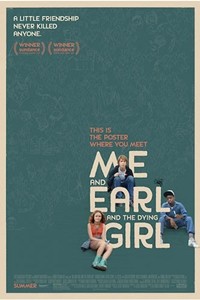 Me and Earl and the Dying Girl
Me and Earl and the Dying Girl
Starring Thomas Mann, Olivia Cooke, RJ Cyler, Nick Offerman, Connie Britton, and Molly Shannon
Directed by Alfonso Gomez-Rejon
Rated PG-13
Run Time: 105 minutes
Genre: Drama
Opens June 19th
By Eric Forthun of Cinematic Shadows
Me and Earl and the Dying Girl is that special breed of teenage film that strikes an emotional cord with every fundamental age group. It's a film marked by deeply rooted compassion from writer Jesse Andrews and director Alfonso Gomez-Rejon, both making their emphatic debuts on screen. The film was widely touted at this year's Sundance Film Festival where it won both the Audience Award and Grand Jury Prize, a rare sweep that demonstrates both its technical and emotional craft in full force. Watching it, there was a sinking feeling that these filmmakers were telling a story far deeper than the surface; when the final act hits, it's a tour-de-force that encapsulates the visual splendor that Gomez-Rejon has employed and the narrative heft that Andrews has slyly delivered. The Perks of Being a Wallflower comes to mind as a strong comparison, another high school story that elevates itself with social cognizance and heartfelt characters. Here's a similarly resonant narrative that tackles cancer with gentility and subtle impact.
The story focuses on Greg (Thomas Mann), a high school student that has strategically planned his social life so that he doesn't belong to any group of kids. Rather, he has select friends and is amicable with almost everyone, even if he doesn't really want to know them. He makes films in his spare time with his buddy Earl (RJ Cyler), most of which involve them spoofing classics by paying homage through sheer stupidity. They're talented filmmakers that spent most of their childhood learning from Greg's father (Nick Offerman), who helped inform them about the social and political nature of filmmaking and the messages it could send. What a smart man. Nonetheless, Greg's mother (Connie Britton) pressures him into befriending a girl with whom he is familiar but does not know: Rachel (Olivia Cooke), who has recently been diagnosed with cancer. Rachel's mother, Denise (Molly Shannon), wants her to socialize with her colleagues while she figures out what will be happening in her daughter's future, while Rachel will have none of that. An unlikely bond forms, though, between Rachel and Greg, leading to the forced friendship developing into a true connection that grows stronger as she grows weaker.
Director Alfonso Gomez-Rejon's film is marked by visual intelligence and power. Take, for instance, the first scene between Greg and Rachel, as he stands at the bottom of her staircase and she looms up at the top. They couldn't be farther apart emotionally, and the scene speaks that perfectly. Another great scene has Rachel in the foreground and Greg in the background, as he pleas with her about a particular issue and he cannot see her face. The tears that form in her eyes are shrouded from him, but not from us. These are a few of the many moments that elevate Me and Earl and the Dying Girl past its conventional indie dramedy nature. The emotional weight given to Rachel's struggle with cancer never strikes a false note, instead opting for a portrayal of a girl that has her own personal and social quirks. She also happens to be a character that has cancer; it doesn't define her. Cooke portrays Rachel with a stern yet tactful nature, showing us a talent that was evident but never really announced in indie disappointments like The Quiet Ones and The Signal. She's the anchor of the film as its final moments demonstrate.
The conceit that carries Dying Girl is Greg's narration, which both singularizes the perspective of the film and elevates the questionable nature of his comments. Mann plays Greg impressively, allowing him to form into a strong man that certainly makes the wrong decision a few times. He's not the most likable character yet we identify with him and his clear emotional struggle and lashing out. That's a fine line to walk, but it works. RJ Cyler, in his debut, gives Earl bouts of humor that fit into the scheme of the film; he can be funny but fragile, and understands the emotional punch behind the film. He doesn't undersell the humor or oversell the drama. The script is written by Jesse Andrews from his own novel; once again, the connection to Stephen Chobsky's Perks of Being a Wallflower carries through as he wrote his own film adaptation too. His work is appropriately balanced for a first-time screenwriter, allowing the narrative to speak equally through Gomez-Rejon's visuals and symbolism as well as his own astute dialogue. The silence in the final half hour of the film is a genius touch as well. Me and Earl and the Dying Girl is a funny drama and touching comedy, walking a tightrope between the two without ever falling down.









